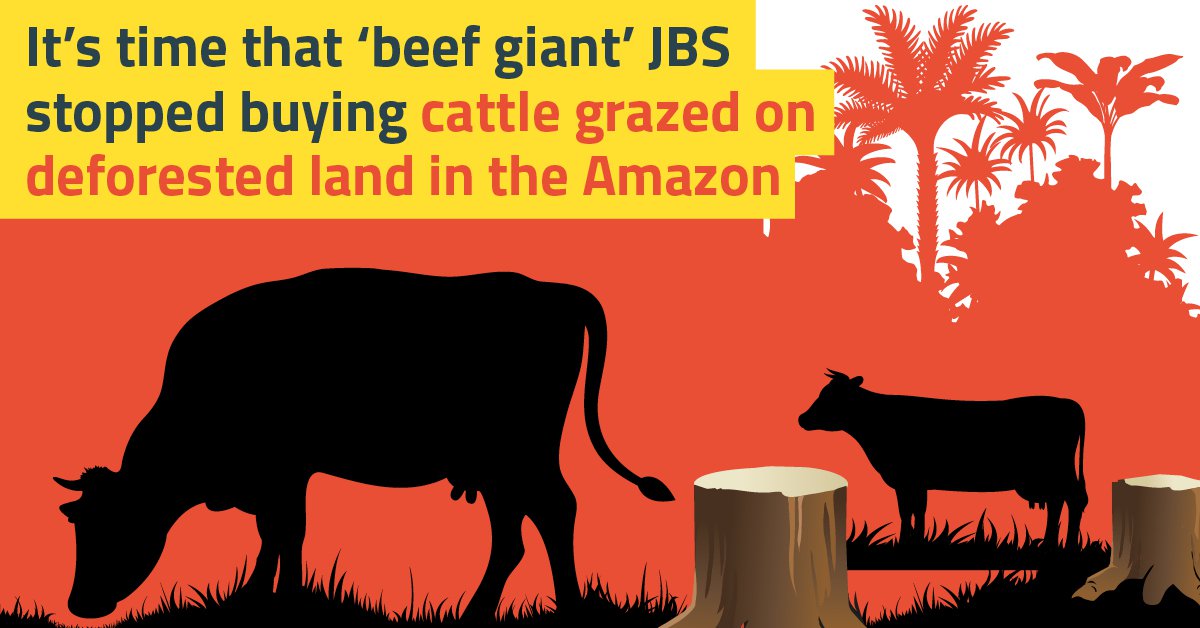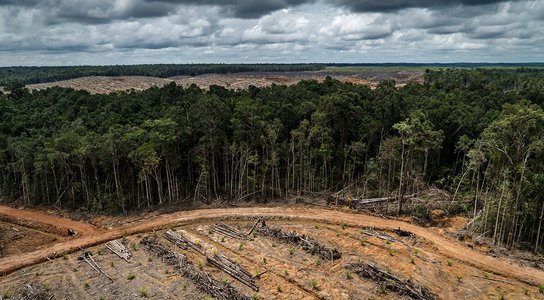Since 2019, we’ve been exposing the world's biggest meatpacker, JBS, and its financial backers for their role in deforestation in the Amazon state of Pará, Brazil. Our new tool tracks deforestation events in JBS's indirect supply chain in the region, and tweets JBS to let them know. We’ll also use it to alert their financiers.
JBS is failing to stop deforestation in one of the world's biggest climate-critical forests. Until they eliminate deforestation and associated human rights abuses from their entire supply chain, we think financial institutions shouldn't be backing them.

When we research deforestation in Brazil, time and time again one of the world’s biggest food companies pops up as a culprit. You’ve probably never heard of them, but this multi-billion-dollar business processes more meat than any other company in the world.
It’s called JBS - and its financial backers include a host of household name banks and financiers like HSBC and BlackRock. In 2021, its revenue reached a record $65billion. That’s more than the entire GDP of Costa Rica.Through arrangements called ‘non-prosecution agreements’, JBS is legally required not to buy from ranches that illegally deforest in the Amazon. But the latest official audit of farms in the JBS direct supply chain in Pará state shows that 16.7% - one in six - have engaged in deforestation to make space for cattle grazing. That’s just the farms who are supplying meat directly to JBS.
The only good news is that there are officials monitoring JBS’s direct supply chain – and holding them accountable. Thanks to the work of local prosecutors, who we have supported with information, JBS has been fined nearly $1million and forced to drop many suppliers.
Sadly however, this scrutiny does not extend to the farms from which most of JBS’s direct suppliers buy their cattle. JBS sources twice as much cattle from indirect suppliers than from their direct suppliers - so, its exposure to deforestation is much higher in its indirect supply chain. Conservative estimates by Chain Reaction Research suggest that the deforestation footprint of these indirect suppliers may have reached a staggering 1.5 million hectares over the last 15 years.
But when we raised the issue with them, they told us it wasn’t yet possible for them to track these deforestation events – but claimed that they will do by 2025.
In other words, an unknown quantity of the beef JBS currently sells comes from cattle grazed on land that until recently was pristine rainforest. Rainforest that is critical to limiting warming of our planet to 1.5°C. Rainforest that is creeping dangerously close to an irreversible ecological tipping point after which it may not be able to generate its own rainfall – with profound consequences for climate.
Brazil Big Beef Watch
To help JBS out, we’ve launched the Brazil Big Beef Watch on twitter (@bigbeefwatch) to alert them, and the public, every time a farm in JBS’s indirect supply chain is linked to a deforestation event in Pará. Let’s just say we’re giving the biggest food company on earth a bit of free advice about where to look to make sure it’s not chopping down trees faster than the world can eat burgers. We’ll also be sharing these tweets with the financial institutions who back JBS to let them know.
Here’s how it works
Deforestation alerts are published regularly by the MapBiomas project. These alerts include the spatial extent of the deforestation and can be readily overlapped with land ownership data. This land ownership data can in turn be linked to cattle transit permits that connect suppliers to buyers at each step of the cattle supply chain.
Every time a deforestation alert is raised, our bot checks large volumes of cattle transport data to determine whether the event took place at a farm that has been in JBS’s indirect supply chain.
These alerts show the date a deforestation event
was detected at a farm that has sold cattle to a direct supplier of JBS.
Because JBS does not publish a current list of its indirect suppliers, it’s
impossible for us to tell whether JBS is still buying indirectly from
this farm. But they should have this supplier information. It’s up to
JBS to make sure they’re not buying from deforesting farms.
For a farm to qualify as an indirect supplier for our bot, it must have sold cattle to a direct supplier of JBS more than once, and at least once since the start of 2020. The direct supplier(s) must also have trades to JBS within 24 months after received cattle from the farm, where the cattle are of the same gender and are the same age or older. Farms that sold cattle directly to JBS at any time were not included.
Of course, JBS could find out this information and do this themselves now. But they’re not. As climate critical forests shrink faster than ever, we’re showing them how it could be done now while there are forests left to protect.
But it’s not just JBS who should be ashamed - it’s their financial backers too
Currently, some of the world’s biggest financial institutions still engage with JBS: HSBC, Santander, Deutsche Bank, Credit Suisse, BNP Paribas, Blackrock, JP Morgan, Morgan Stanley and Aviva.
Our analysis of investment and underwriting transactions will keep shining a spotlight on the banks and asset managers that are financing the beef giant despite its ongoing deforestation.
JBS knows that we’re providing them with this service free of charge. In response to Global Witness, JBS said that their “technical team found the information provided to be overall scarce and superficial, but a better understanding about the methodology used (databases and information crossing) would be helpful for JBS to provide a more detailed and robust feedback when the data are published”. They described Global Witness’s method of identifying JBS’s indirect suppliers as "confusing and opaque".
Ultimately, we hope JBS do their due diligence properly themselves. Until they do, and ensure they eliminate deforestation and human rights abuses from their entire supply chain, we think financial institutions shouldn’t be backing them.
This blog was updated on 21/04/2023 to correct an error in the original text. The original post claimed that JBS did not respond to Global Witness's request for comment, which was incorrect. It has therefore been
updated to reflect their comments.

